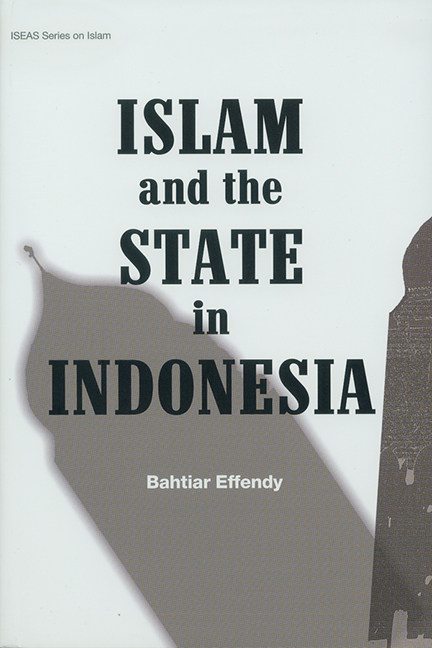Book contents
- Frontmatter
- Dedication
- Contents
- Abbreviations
- Acknowledgements
- Chapter 1 Introduction: The Problem of Political Relationship between Islam and the State
- Chapter 2 Explaining the Uneasy Relationship: Political Antagonism between Islam and the State in Indonesia
- Chapter 3 Emergence of the New Islamic Intellectualism: Three Schools of Thought
- Chapter 4 Implications of the New Islamic Intellectualism: Ideas and Practices
- Chapter 5 Beyond Parties and Parliament: Reassessing the Political Approach of Islam
- Chapter 6 Reducing Hostility: The Accommodative Responses of the State
- Chapter 7 Conclusion: Towards an Integrated Political Relationship between Islam and the State
- Chapter 8 Political Islam in Post-Soeharto Indonesia: A Postscript
- Bibliography
- Index
- About the Author
Chapter 5 - Beyond Parties and Parliament: Reassessing the Political Approach of Islam
Published online by Cambridge University Press: 21 October 2015
- Frontmatter
- Dedication
- Contents
- Abbreviations
- Acknowledgements
- Chapter 1 Introduction: The Problem of Political Relationship between Islam and the State
- Chapter 2 Explaining the Uneasy Relationship: Political Antagonism between Islam and the State in Indonesia
- Chapter 3 Emergence of the New Islamic Intellectualism: Three Schools of Thought
- Chapter 4 Implications of the New Islamic Intellectualism: Ideas and Practices
- Chapter 5 Beyond Parties and Parliament: Reassessing the Political Approach of Islam
- Chapter 6 Reducing Hostility: The Accommodative Responses of the State
- Chapter 7 Conclusion: Towards an Integrated Political Relationship between Islam and the State
- Chapter 8 Political Islam in Post-Soeharto Indonesia: A Postscript
- Bibliography
- Index
- About the Author
Summary
In the old days, Islamic parties were often considered as representing the Muslim community. Thus, the aspiration of the Muslim community was perceived as identical with that of the parties. This should not have been the case as only some Muslims joined political parties based on Islam. Now that three existing socio-political organizations such as PPP, Golkar and PDI have accepted Pancasila as their [ideological] basis, formally there are no longer any parties which wave an Islamic flag. The aspiration of the Muslim community can now be articulated through various socio-political groups.
Lukman HarunISLAMIC STRATEGY IN THE PAST
Based on the previous discussion, it can be suggested that at some point the history of Indonesia's political Islam was characterized by two dominant features. To achieve their desired goals, the earlier leaders and activists of political Islam relied mostly on (1) non-integrative or partisan politics and (2) parliament as the only playing field.
The partisan politics approach was directly related to the grouping of Islam as political forces (that is, Masyumi, later to be succeeded by Parmusi, Nahdlatul Ulama [NU], Partai Sarekat Islam Indonesia [PSII], and Perti. What was then known as political Islam appeared to become the sole enterprise of Islamic parties. In other words, political Islam emerged to become an exclusive project and venture of these parties to envision and fulfil.
It is arguable that under such political groupings Islam gained relative clarity with respect to its formal and institutional role in politics. In fact, there had been a growing inclination to perceive the mere presence of these parties as evidence of the dynamism and vitality of political Islam. This made their existence seem to be theologically and politically imperative.
However, given the severity of the ideological polarization among the existing political parties, especially during the liberal as well as Guided Democracy periods, it became apparent that these political groupings had further religious political consequences. They posed some constraints to Islam as a single religious entity.
- Type
- Chapter
- Information
- Islam and the State in Indonesia , pp. 124 - 148Publisher: ISEAS–Yusof Ishak InstitutePrint publication year: 2003

